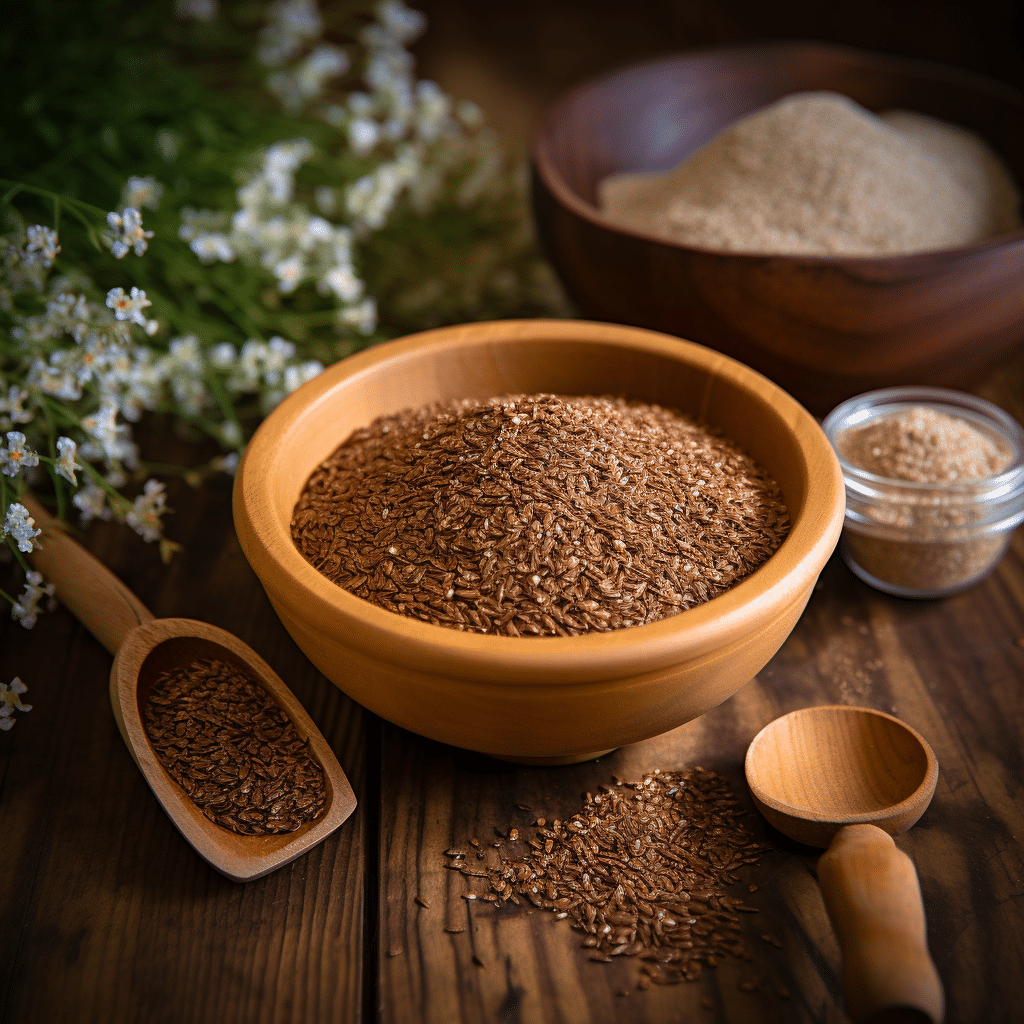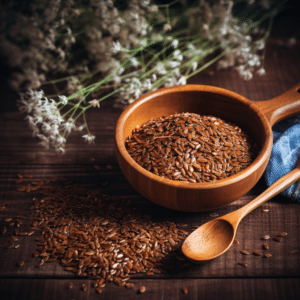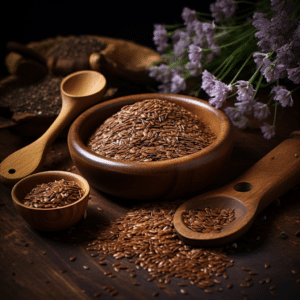
Flaxseed: Nutrient-Rich Seed with Health Benefits
Flaxseed is a tiny, tan brown or golden seed from flax (Linum usitatissimim) that is considered the world’s first cultivated superfood. These seeds make flax oil, seasonings, textile linens, and paper. Besides the many uses, flaxseed has an excellent nutrition profile with immense health benefits. It’s the richest source of plant-based omega-3 fatty acids worldwide. Flaxseed is also packed with other essential nutrients like linolenic acid, protein, fiber, manganese, thiamin, magnesium, and vitamin B6.
Unlike whole grains, is used differently and in small amounts in culinary. Like adding it to grain bases like breakfast cereal or oatmeal. So, what is flaxseed? Is it whole grain? Stay tuned.

Is Flaxseed Wholegrain?
Since flaxseed is a seed, not a grain, it cannot be classified as whole grain. As such, flaxseed is not a whole grain, but rather falls into the category of oilseeds, the same as sunflower and sesame seeds.
Although authentic grains are cereals, some plants are not actual grains but are considered grains. That’s so because they are used as grains. Such plants are called pseudocereals and include buckwheat and amaranth quinoa.
So, flaxseed is by nature a seed and not a grain. It’s also not a pseudocereal as it’s not used like cereals. For these reasons, is not a whole grain but an oilseed.
What’s The Difference Between Grains And Seeds?
Knowing the differences between seeds and grains is vital to understanding why flaxseed is a seed, not a grain.
About Seeds
There are three parts to a seed: the seed coat, the embryo, and the endosperm. The seed coat protects the embryo and holds it together. The seeds come from ovules that have been created. Ovules are structures that hold the female reproductive cells of the plant. So, when the pollen, which is made up of male cells, fertilizes the ovules, the ovules grow into a seed.
About Grains
Grains are simply fruits of true cereal plants. Although tiny, grains are made up of both the plant’s fruit and seed fused.
In fleshy fruits like avocado, the pericarp surrounds the seed and can be separated from the seed. This pericarp comprises three layers. They are endocarp, mesocarp, and exocarp.
On the other hand, in non-fleshy fruits like corn, the pericarp is fused with the seed into a single layer, forming grains.
Types Of Flaxseed
There are two types of golden and brown. There’s very little difference in the nutritional composition of these two types of flaxseed. As for taste, the golden is more flavorful with a nuttier taste than the brown one.
Flaxseed, also called linseed, can be an excellent addition to your diet. They can be eaten whole or ground. Note that grounded flaxseed has a higher nutrient bioavailability than whole flaxseed. Flaxseed can also make extracts, oil, flour, and food products like salad dressings.
These seeds can be found as whole, ground seeds, flaxseed oil, flax meal (flour), extracts, an ingredient in packaged snacks like cookies, crackers, or supplements in the form of capsules or tablets.
Flaxseed Nutrition Profile
Flaxseed is rich in essential nutrients, including:
Calories
The calories from mainly come from carbs and fats. There are 55 calories in a tablespoon of flaxseed.
Carbohydrates
Most of the carbs in come from fiber. A tablespoon of whole flaxseed has about 3 grams of fiber. Even though fiber can’t be digested, it helps keep blood cholesterol levels at a healthy level, improves digestive health by avoiding constipation, and makes you feel full so you don’t eat too much.
Flaxseed also contains a tiny amount of naturally occurring sugar. The sugar is so tiny that the glycemic load of this seed is zero.
Fats
Flaxseed contains about 4 grams of fat per tablespoon of whole flaxseed. The amount is slightly less in grounded flaxseed. Different types of fat are present in polyunsaturated, and monounsaturated fats.
There are two kinds of polyunsaturated fats: omega-3 fatty acids and omega-6 fatty acids. One tablespoon of flaxseed has 230 milligrams of omega-3 fatty acids and 606 milligrams of omega-6 fatty acids. This makes a great source of important fatty acids that come from plants.
The amount of monounsaturated fat is minimal, barely one gram – about 0.4 grams of monounsaturated fats in one serving of flaxseed.
Protein
Flaxseed has a considerable amount of protein – about 2 grams in one tablespoon of flaxseed. Although this amount is small, it can add to your daily protein needs.
Minerals And Vitamins
Since the primary nutrient in is fats and carbs, it offers a small amount of vitamins and minerals considering the small serving size. Flaxseed provides 11% of your daily thiamin intake and 2% of your recommended folate, niacin, and vitamin B6 intake. Note that these values are based on 2000 calories per day.
When it comes to minerals, flaxseed has 13%, 10%, 7%, 6%, and 4% of the daily suggested amounts of manganese, magnesium, phosphorus, copper, and selenium, respectively.
Health Benefits Of Flaxseed
Flaxseed offers various health benefits like:
Supporting Heart Health
The essential fatty acids in flaxseed are great at lowering blood pressure and slowing the progression of atherosclerosis.
Maintain Optimal Blood Sugar Levels
Having a zero glycemic load, flaxseed help maintains optimal blood sugar levels.
Protect Against Cancer
Research suggests flaxseed may help reduce your risk of certain cancers like breast cancer. Other studies show a positive relationship between flaxseed and its effects in helping treat lung, prostate, ovary, colon, and liver cancers.
Prevents Constipation
Flaxseed is high in dietary fiber. Fiber provides bulk to stool, aiding peristalsis. This ensures regular and smooth bowel movements, preventing constipation.
Assist In Weight Loss
Flaxseed comprises mainly fats that have high satiating effects, unlike carbs. High satiety means you get full fast even after eating a small number of seeds. This prevents overeating, which is among the top contributors to overweight.

Conclusion
Flaxseed is just a seed, nothing else. Because of this, it is called a soybean instead of a whole grain. You can eat this seed whole or grind it up. It can also be used to make flours, oils, extracts, snacks, and capsule or tablet-shaped vitamins. has a great nutritional profile and may be good for your health. can be eaten on their own, in smoothies, bread, cakes, or as a topping for drinks and meals.